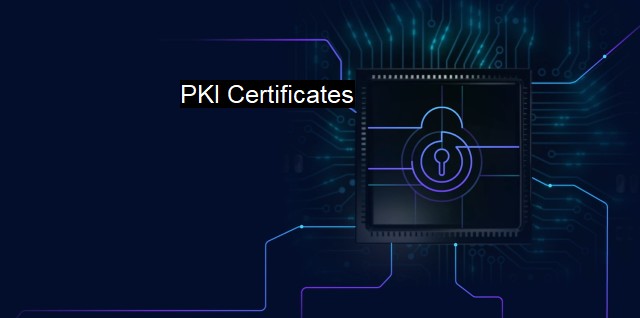What are PKI Certificates?
Ensuring Cybersecurity with PKI Certificates: The Essential Building Blocks of the Digital Age
Public Key Infrastructure (PKI) Certificates emerged as a technology pillar in cybersecurity and are instrumental in protecting sensitive data and maintaining secure communication channels against the backdrop of increasing cyber threats around the world. They serve a foundational and critical function in the complex world of cybersecurity.PKI certificates, also known as digital certificates, consist of a set of software, hardware, policies, procedures and standards necessary to manage, distribute, use, store and revoke digital certificates in a secure manner. This web of trustworthy infrastructure primarily allows users—be it individuals, companies, systems or entities—to exchange private communication over the public network securely, and also assert the identity of a digital entity, thereby mitigating the risk of impersonation and phishing.
The magic behind PKI Certificates lies in the unique combination of a pair of encryption keys—a public key, widely shared and accessible, and a private key, held secretly by the owner. This combination of keys enables the two fundamental aspects of a PKI system: encryption of data for security and assignation of digital signatures for validation.
In encryption, the sender uses the receiver's public key to encrypt a message which can then only be decrypted by the receiver's private key—thus ensuring that only the recipient can open it. On the other hand, digital signatures—testimonial confirmations of a source’s authenticity—are developed through an inverse process where the sender uses their private key to sign a message and the receiver verifies it using the sender’s public key.
One remarkable aspect of PKI Certificates is its utilization in SSL, or Secure Socket Layer Certificates. SSL certificates capitalize off PKI to authenticate the server's identity to guarantee safe and secure connections for websites. These certificates—which are dispatched by credible, third-party certificate authorities (CAs)—affirm to visiting users that the domain belongs to the entity laying claim to it, thus bolstering users' trust and reducing the chance of malicious interceptions.
At the heart of the PKI system is the CA, responsible for verifying the identities of claimants and issuing, managing, and revoking certificates accordingly. In doing so, the CAs aid in creating a trust environment where users can rely on the legitimacy and security of these data exchanges.
Another cornerstone of any PKI setup is a Certificate Revocation List (CRL), which contains certificates that have been prematurely invalidated by their issuer. Contingencies like a compromised private key necessitate safeguards like CRLs or their variant—Online Certificate Status Protocol (OCSP)—which allow users to verify the validity of a PKI Certificate before they forage ahead with reliance on its security.
In the expansive realm of antivirus and cybersecurity, PKI Certificates secure data packages during transition, lowering the risk of data being intercepted and manipulated by hackers. They also draw on digital signatures to confirm the credibility of downloadable content from the internet—be it bank transactions or even updating antivirus software—to protect the user against fraudulent schemes.
Future transformations of cybersecurity will duly necessitate that PKI systems grow in parallel. Emerging technologies like Internet of Things (IoT) exacerbate security demands given the significant volume of sensitive data being exchanged. Responding to such challenges requires PKI systems to evolve in strength, sophistication, and agility to prevent potential threats and protect data integrity.
PKI Certificates integrate the principles of data encryption and signature, applied tactfully to navigate cybersecurity threats wherein their absence could expose vulnerabilities open for exploitations. Certificate Authorities, digital keys, and revocation processes together prop the buttressing pillars of the PKI system. On that premise, the profound role of PKI Certificates in understanding and fortifying cybersecurity is undeniably pivotal.

PKI Certificates FAQs
What is a PKI certificate?
A PKI (Public Key Infrastructure) certificate is a digital certificate that contains information about a public key and the identity associated with it. It is used to establish trust between two parties in a secure communication channel in cybersecurity.How do PKI certificates help with antivirus protection?
PKI certificates help with antivirus protection by enabling secure communication between the antivirus software and the servers it interacts with. This ensures that the antivirus software receives updates and downloads only from trusted sources, reducing the risk of malware infection.What is the process of obtaining a PKI certificate?
The process of obtaining a PKI certificate involves creating a public key-private key pair and submitting a certificate request to a trusted Certificate Authority (CA). The CA then verifies the identity of the requester and issues a signed digital certificate that includes the requester's public key and other relevant information.How often do PKI certificates need to be renewed?
The frequency of PKI certificate renewal varies based on the organization's policies and the type of certificate. Some certificates may need to be renewed annually, while others may be valid for several years. It is important to keep track of certificate expiration dates and renew them in a timely manner to avoid potential security issues.| | A | | | B | | | C | | | D | | | E | | | F | | | G | | | H | | | I | | | J | | | K | | | L | | | M | |
| | N | | | O | | | P | | | Q | | | R | | | S | | | T | | | U | | | V | | | W | | | X | | | Y | | | Z | |
| | 1 | | | 2 | | | 3 | | | 4 | | | 7 | | | 8 | | |||||||